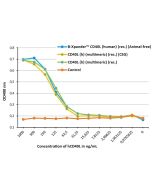Cookie Policy: This site uses cookies to improve your experience. You can find out more about our use of cookies in our Privacy Policy. By continuing to browse this site you agree to our use of cookies.
AdipoGen Life Sciences
anti-CD40 (mouse), mAb (FGK45)

| Product Details | |
|---|---|
| Synonyms | Tumor Necrosis Factor Receptor Superfamily Member 5; CD40L Receptor |
| Product Type | Monoclonal Antibody |
| Properties | |
| Clone | FGK45 |
| Isotype | Rat IgG2a |
| Source/Host | Purified from concentrated hybridoma tissue culture supernatant. |
| Immunogen/Antigen | Recombinant mouse CD40 fusion protein. |
| Application |
Flow Cytometry |
| Crossreactivity | Mouse |
| Specificity |
Recognizes mouse CD40. |
| Purity | ≥95% (SDS-PAGE) |
| Purity Detail | Protein G-affinity purified. |
| Endotoxin Content | <0.01EU/μg purified protein (LAL test; Lonza). |
| Concentration | 1mg/ml |
| Formulation | Liquid. In PBS containing 0.02% sodium azide. |
| Isotype Negative Control | |
| Other Product Data |
Widely used stimulatory MAb to CD40. Shown to indirectly activate natural killer (NK) cells, producing significant antitumor and antimetastatic effects. Effective in boosting immune responses against infectious agents and can potentially be used to treat chronic autoimmune inflammatory processes. |
| Shipping and Handling | |
| Shipping | BLUE ICE |
| Short Term Storage | +4°C |
| Long Term Storage | -20°C |
| Handling Advice |
After opening, prepare aliquots and store at -20°C. Avoid freeze/thaw cycles. |
| Use/Stability | Stable for at least 1 year after receipt when stored at -20°C. |
| Documents | |
| MSDS |
 Download PDF Download PDF |
| Product Specification Sheet | |
| Datasheet |
 Download PDF Download PDF |
CD40 belongs to the TNF-receptor superfamily and is essential in mediating a broad variety of immune and inflammatory responses including T cell-dependent immunoglobulin class switching, memory B cell development, and germinal center formation. The interaction of CD40-CD40L is necessary for amyloid-beta-induced microglial activation, and thus is thought to be an early event in Alzheimer disease pathogenesis. CD40 is constitutively expressed by antigen presenting cells, including dendritic cells, B cells and macrophages. Consistent with its widespread expression on normal cells, CD40 is also expressed on a wide range of tumor cells, including non-Hodgkin's and Hodgkin's lymphomas, myeloma and some carcinomas including nasopharynx, bladder, cervix, kidney and ovary.
- The SCID but not the RAG-2 gene product is required for S mu-S epsilon heavy chain class switching: A. Rolink, et al.; Immunity 5, 319 (1996)
- Characterization of immature B cells by a novel monoclonal antibody, by turnover and by mitogen reactivity: A.G. Rolink, et al.; Eur. J. Immunol. 28, 3738 (1998)
- Anti-CD40 antibody induces antitumor and antimetastatic effects: the role of NK cells: J.G. Turner, et al.; J. Immunol. 166, 89 (2001)
- Therapeutic activity of agonistic monoclonal antibodies against CD40 in a chronic autoimmune inflammatory process: C. Mauri, et al.; Nat. Med. 6, 673 (2000)
- Ovarian insufficiency and early pregnancy loss induced by activation of the innate immune system: A. Erlebacher, et al.; J. Clin. Invest. 114, 39 (2004)
- CD154 is a negative regulator of autoaggressive CD8+ T cells in type 1 diabetes: C.M. McGregor, et al.; PNAS 101, 9345 (2004)
- IRF-7 is the master regulator of type-I interferon-dependent immune responses: K. Honda, et al.; Nature 434, 772 (2005)
- In vivo and in vitro regulation of type I IFN synthesis by synergistic effects of CD40 and type II IFN: J.A. Greene, et al.; J. Immunol. 176, 5995 (2006)
- IL-10- and IL-12-independent down-regulation of allergic sensitization by stimulation of CD40 signaling: P.W. Hellings, et al.; J. Immunol. 177, 5138 (2006)
- Agonistic Anti-CD40 Antibody Profoundly Suppresses the Immune Response to Infection with Lymphocytic Choriomeningitis Virus: C. Bartholdy, et al.; J. Immunol. 178, 1662 (2007)
- Excessive interferon-α signaling in autoimmunity alters glycosphingolipid processing in B cells: A. Hee-Meng Tan, et al.; J. Autoimmun. 89, 53 (2018)
- Kinetics of free and ligand-bound atacicept in human serum: M. Eslami, et al.; Front. Immunol. 13, 1035556 (2022)







